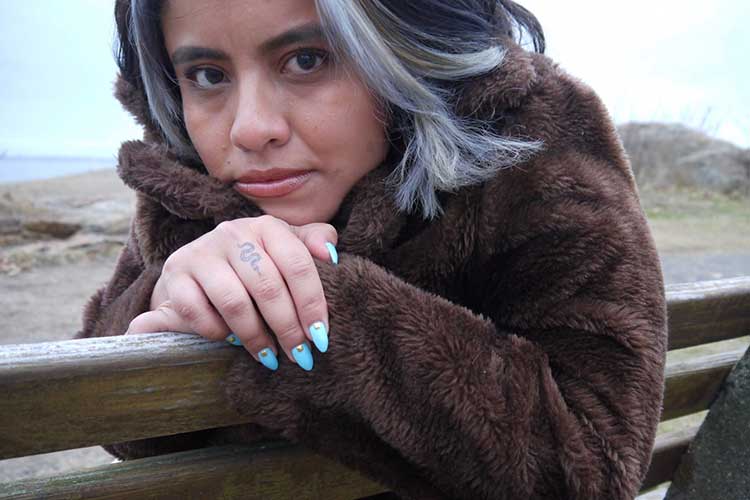‘Undocumented Americans’ author: ‘Create the art you see in yourself’
UC Berkeley’s On The Same Page virtual panel explores experiences of Undocumented Americans author Karla Cornejo Villavicencio and Orange is the New Black actress, Diane Guerrero.
August 24, 2021

UC Berkeley’s On The Same Page virtual panel last Friday explored experiences of Undocumented Americans author Karla Cornejo Villavicencio and Orange is the New Black actress, Diane Guerrero. (Photo by Talya Zemach-Bersin)
As an undocumented Ecuadorian child growing up in Queens, New York, Karla Cornejo Villavicencio said she always knew she was going to be an artist.
While studying at Harvard University, where she was one of the first undocumented students to attend the school, Villavicencio was drawn to do something about the “corny” caricatures of Latinx people she read in mainstream literature.
“My disposition as an artist was kind of like ‘f— the man,’” she said during a virtual event last Friday. “And ‘the man’ was really bad sentences that used Spanish in italics, talked about our calloused hands and how hard working we are. (Stories) where the ‘American Dream’ always ends up in a happy place.”

A contrarian response to those representations is Villavicencio’s book Undocumented Americans, which is UC Berkeley’s pick for this year’s On the Same Page program, a 16-year-old program that gives all incoming students a copy of the same book to read over the summer and a shared intellectual experience when they arrive to campus.
A 2020 National Book Award finalist, the creative non-fiction book, which is partially a memoir, delves into the complex experiences of Villavicencio’s own family and other undocumented immigrants.
“While we have other texts that give the experience of undocumented people in the U.S., and in other places in the world, Karla’s prose draws us in with each story she describes,” said Berkeley ethnic studies lecturer Pablo Gonzalez, who is on the program’s planning committee. “As an anthropologist, I am hooked on her ethnographic prose. … I am even more excited about a book that gives the milieu of experiences of those living in the shadows.”
Reading and discussing Villavicencio’s book allows students from different backgrounds and fields of study to gain their own personal perspective about undocumented immigrants, said Aileen Liu, who has led this year’s program as director of curricular engagement initiatives at Berkeley’s College of Letters and Science.
“We’re opening the door to the communal experience that’s such an integral part of a world-class education,” Chancellor Carol Christ said Friday. “It is a strong, supportive community that allows us to take intellectual risks, to continuously challenge the status quo, to learn from one another and to thrive amidst an amazing diversity of interests, origins and perspectives.”
Last week, the program kicked off those discussions with a virtual panel with Villavicencio, which was moderated by her friend and immigration activist Diane Guerrero, who also played Maritza Ramos on the television show Orange is the New Black.
At Friday’s event, Guerrero said reading Undocumented Americans changed her life.
“As a person who has experienced so much within the immigration system, and talking about it in a way where I couldn’t really help the people I wanted to help, this book really helped me,” said Guerrero, whose parents and older brother were deported to Columbia when she was a teenager. “It really did make me feel like I wanted to take ownership of who I was, and my story.”

Immigration activist and Orange is the New Black actress Diane Guerrero (left) had a playful interview with Undocumented Americans author Karla Cornejo Villavicencio last Friday.
Throughout the panel, Villavicencio spoke about the emotional toll producing the book took on her. Delving into such a visceral and personal place, she knew she would never write a book like this again because “it f—-ed me up.”
“A lot of us artists who choose to injure ourselves in these ways to tell these stories are doing it because we feel the dignity and humanity of our people are on the line,” she said.
Villavicencio encouraged Berkeley’s new students to “create the art you see in yourself,” and to never be afraid to seek help in maintaining mental health and wellness.
Villavicencio told the students she hopes her book “widens your understanding of what art by Latinx people can be.” She asked students to question the way they analyze the book, and to put the literary content — and the experiences of undocumented people — ahead of her personal biography and profile as an author.
“My book is essentially saying ‘Hi, we’re human beings. We hurt too. Stop looking at us like caricatures,’” Villavicencio said. “I would not have had to write that book if we were being treated as human beings.”